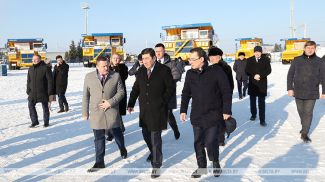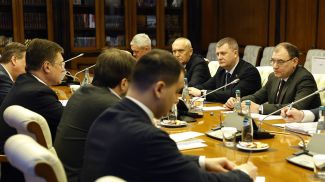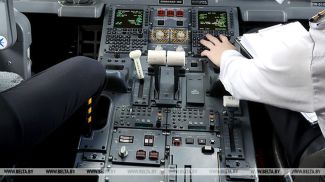MINSK, 10 April (BelTA) – Prime Ministers of the EAEU member states have approved the economic measures and mechanisms amid the COVID-19 outbreak, Chairman of the Board of the Eurasian Economic Commission Mikhail Myasnikovich said as he commented on the meeting of the Eurasian Intergovernmental Council held via videoconferencing on 10 April, BelTA has learned.
According to Mikhail Myasnikovich, nine issues were considered at the meeting. One of the key issues was the measures and mechanisms to support the economies of the EAEU countries in the context of the spread of coronavirus. Thus, the intergovernmental council adopted a package of measures in the Eurasian Economic Union aimed to provide vital needs of the population, maintain mutual trade, ensure freedom of movement of goods in the face of the COVID-19 pandemic and create conditions for further economic growth.
As Mikhail Myasnikovich stressed, the EEC has restructured its activities and has focused on daily pressing issues. The package of measures has been developed jointly with the governments of the EAEU member states. “We structured the proposed measures into two packages," he explained. “The first package is a set of urgent, temporary stabilization measures. It suggest the interaction of appropriate EAEU bodies in the conduct of sanitary and epidemiological measures to prevent and minimize the impact of the pandemic, consultations on the situation on food markets, prompt supply of staple goods,” he said.
The package of urgent measures also suggests setting up a green corridor for the import of critical goods. This involves temporary zeroing of import customs duties, easing customs procedures, including the possibility of automatic registration of declarations, clearing goods necessary to prevent and eliminate the consequences of the pandemic as a matter of priority.
In addition, the first package implies the launch of uniform temporary restrictions on the export of critical goods to third countries; prompt consultations at the level of deputy prime ministers of the EAEU countries on draft national legal acts to impose temporary restrictions related to the need to respond to the spread of coronavirus infection; consultations of authorized bodies in the field of technical regulation; temporary reduction or zeroing of import customs duties on components and materials for certain industries taking into account their economic and social importance, etc.
The package of measures underlines the need to implement joint measures to create antiviral drugs and vaccines and establish their mass production. The need for uninterrupted transport and freight transport is highlighted.
The second package implies systemic measures for further economic development. “It includes measures to ensure macroeconomic stability and sustainability of financial markets and payment systems, to support enterprises of the real economy sector, to ensure greater participation of regional financial institutions in the process of supporting our economies in the face of the pandemic,” Mikhail Myasnikovich explained.
This package also includes measures to promote digitalization of trade, including making more use of electronic shipping documents, to digitize the interaction of logistics operators, to expand the use of electronic digital signature, and to ensure automatic registration and release technologies of import, export and transit goods.
The meeting of the Eurasian Intergovernmental Council was chaired by Belarus' Prime Minister Sergei Rumas.













